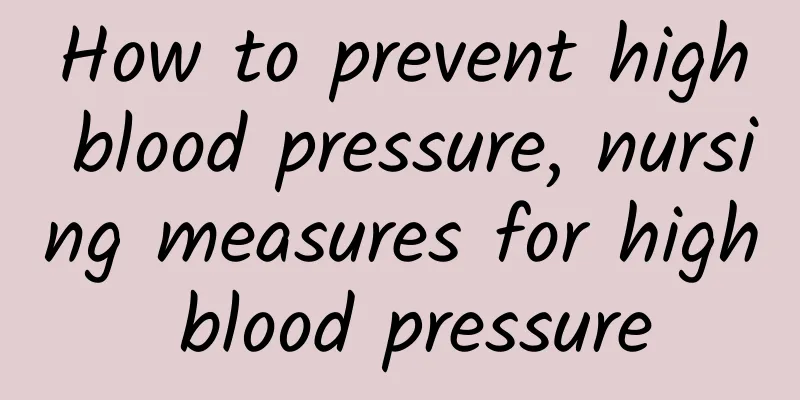How to prevent high blood pressure, nursing measures for high blood pressure

|
Hypertension is a common chronic disease that poses a serious threat to human health. Long-term hypertension increases the risk of cardiovascular and cerebrovascular diseases. Therefore, it is particularly important to prevent and control hypertension through a scientific lifestyle and effective care measures. 1. Methods to prevent hypertension 1. Low-salt diet. Reducing salt intake is one of the important measures to prevent high blood pressure. The daily salt intake should be controlled below 5 grams, and avoid eating foods with high salt content such as pickles, cured meat, and ham. At the same time, you can increase the intake of foods rich in minerals such as potassium, calcium, and magnesium, such as fresh fruits and vegetables and whole grains, which help regulate blood pressure. 2. Low-fat, high-fiber diet. Eat a light diet and avoid high-fat and high-sugar foods. Reduce the intake of saturated fat and trans fat, and increase the proportion of unsaturated fatty acids, such as olive oil and fish oil. In addition, eating more foods rich in dietary fiber, such as oats, buckwheat, vegetables, fruits, etc., will help control weight and blood sugar. 3. Quit smoking and limit alcohol consumption. Smoking and excessive drinking can raise blood pressure and increase the risk of cardiovascular and cerebrovascular diseases. You should quit smoking as soon as possible and limit your alcohol intake to no more than 25 grams per day for men and 15 grams per day for women. It is best to choose low-alcohol alcohol and avoid strong liquor. 4. Control your weight. Obesity is an important risk factor for hypertension. Controlling your weight and avoiding obesity through a reasonable diet and moderate exercise are effective ways to prevent hypertension. Doing at least 150 minutes of moderate-intensity aerobic exercise per week, combined with strength training, can help increase muscle strength and improve basal metabolic rate. 5. Relieve mental stress. Long-term mental stress can lead to high blood pressure. Maintain a good attitude and avoid long-term mental tension and anxiety. You can relax and reduce stress by listening to music, reading, traveling, meditating, doing yoga, etc. 6. Regular physical examinations. Regular blood pressure measurement and physical examinations should be performed to detect abnormal blood pressure in a timely manner. Especially for high-risk groups such as those with a family history of hypertension, obesity, diabetes, etc., regular blood pressure monitoring and related examinations such as electrocardiograms, blood sugar, blood lipids, etc. should be performed to prevent problems before they occur. 2. Nursing measures for hypertension 1. Blood pressure monitoring. Hypertensive patients should learn to monitor their blood pressure and record blood pressure values at fixed time points, such as in the morning and evening, so as to compare whether there are abnormal fluctuations in blood pressure in the recent period. It is recommended to use a verified upper arm medical electronic blood pressure monitor, empty the bladder 30 minutes before measurement, avoid drinking, coffee, smoking or strenuous exercise, and stay in a quiet state for 5-10 minutes before measuring. In order to ensure the accuracy of the measurement, each measurement should be fixed: the blood pressure monitor, the location, the body position, and the time. 2. Healthy lifestyle. This includes a low-salt, low-fat, high-fiber diet, quitting smoking and limiting alcohol consumption, maintaining a reasonable weight, doing moderate aerobic exercise, maintaining a regular work and rest schedule, getting enough sleep, and avoiding staying up late. For patients with hypertension, 30-60 minutes of moderate-intensity aerobic exercise every day can help improve cardiopulmonary function and stabilize blood pressure. 3. Mental care. Hypertensive patients should maintain a positive and optimistic attitude and avoid being too emotional, which can cause high blood pressure. They can relax and relieve stress by listening to music, meditating, taking deep breaths, etc. Maintaining a mental balance can help stabilize blood pressure and reduce the adverse effects of high blood pressure. 4. Rational use of drugs. Hypertensive patients should strictly follow the doctor's orders to use antihypertensive drugs, such as calcium channel blockers such as nifedipine controlled-release tablets and amlodipine besylate tablets, and ARB drugs such as valsartan capsules and losartan potassium capsules, to keep blood pressure levels stable. Patients should take medication on time and should not increase or decrease the dosage or change medications on their own. If adverse reactions occur, they should inform the doctor in time and adjust the treatment plan. 5. Professional medical care. Hypertensive patients should go to the hospital regularly for examinations by professional doctors or nurses to assess cardiovascular risks and adjust treatment plans in a timely manner. For patients with unstable blood pressure, measure blood pressure every morning before taking medication, after urination, and before going to bed at night, and record the measurement results in detail so that the doctor can adjust the treatment plan. 6. Diet care. Hypertensive patients should eat a light and easy-to-digest diet and maintain a balanced diet. Avoid pickled and spicy foods, and the daily sodium intake should not exceed 6 grams. Eat a moderate amount of high-quality protein, such as fish, lean meat, and soy products. Increase the intake of vitamins and fiber, and eat more fresh vegetables and fruits, such as tomatoes, cucumbers, and apples, which will help regulate blood pressure and maintain good health. Conclusion Although hypertension is a common chronic disease, it can be effectively prevented and controlled through a scientific lifestyle and effective care measures. A low-salt, low-fat, high-fiber diet, quitting smoking and limiting alcohol, controlling weight, exercising moderately, maintaining psychological balance, regular blood pressure monitoring and professional medical care are all important measures to prevent hypertension and care for patients with hypertension. Author: Li Yanchao Yongnian District Traditional Chinese Medicine Hospital Handan, Hebei |
<<: Cold and cough that won’t go away? Learn about the nine respiratory tract items!
>>: Doctors remind: If your child has a high fever convulsion, don’t do these 7 things!
Recommend
What causes abdominal pain in women during early pregnancy?
After pregnancy, the pregnant woman's body wi...
How much do you know about surgical treatment of inflammatory bowel disease?
Author: Fan Xueshun, Chief Physician of China-Jap...
What is the best treatment for breast hyperplasia?
Breasts are a symbol of female beauty. Having a p...
Why do I hate heat when I'm pregnant?
After pregnancy, pregnant women have to face vari...
Counterpoint: US smartphone sales to grow 5% year-on-year in July 2024
According to Counterpoint’s latest US smartphone ...
Confirmed! The human immune system can "remember" the new coronavirus for more than a year
After fighting off the attack of the new coronavi...
How much do you know about the benefits of shoulder and neck scraping?
Scraping is a very popular health-preserving meth...
Parents must read! Comprehensive prevention and treatment strategies for allergic rhinitis in children
Author: Zhao Jing, Chief Physician, Children'...
What is the reason for the small fleshy particles on the labia?
The female vulva consists of the labia majora and...
How to get back in shape after giving birth
Many female friends find it difficult to accept t...
What to eat to prevent anemia
Anemia is caused by the body's inability to p...
How to take care of yourself after a missed abortion
Missed abortion is a non-induced miscarriage meth...
Which is better, the TV series or the novel "Joy of Life"? Why can't I buy the book "Joy of Life"?
The TV series "Joy of Life" is adapted ...
What can we do to delay aging during menopause?
Aging is very normal. It happens to older people....
What diseases will women get if they work too hard?
As society develops better and better, women also...









